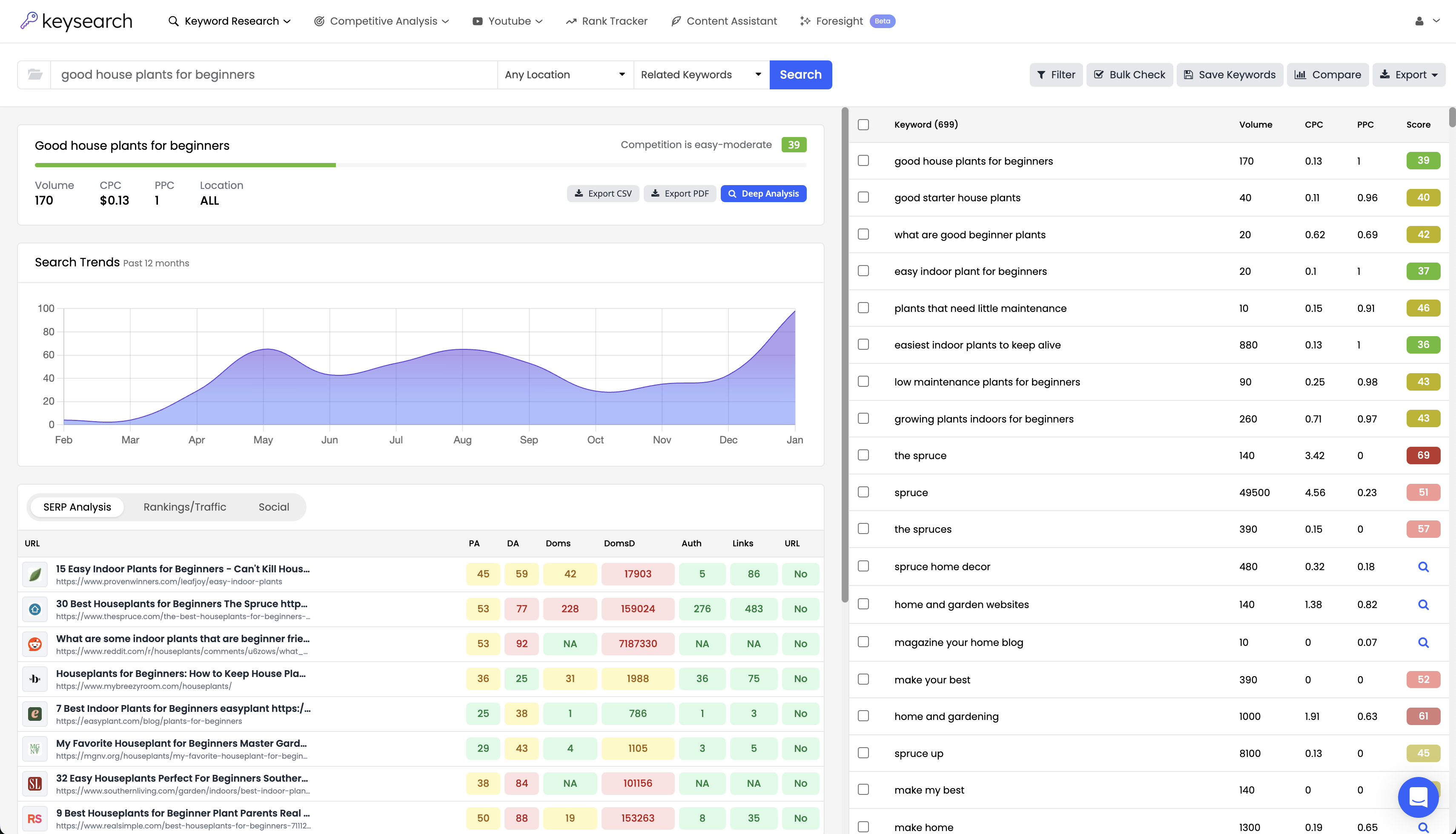Whether you’re trying to rank your product listings organically to drive more profitable sales or you want to fine-tune your keyword targeting for paid advertising, effective keyword research can make or break your results.
It’s far too easy to get bogged down by all the keyword metrics, and it’s only going to get worse. Tools like SEMrush or Ahrefs are constantly creating new proprietary metrics that only confuse users further.
So what are the most important keyword research metrics to know? You’ve come to the right place. We’ll break down the essential keywords SEO metrics to use as part of your strategy:
- Search volume
- Keyword difficulty
- Cost-per-click (CPC)
- Click-through-rate (CTR)
- And more
More importantly, you’ll learn how to actually use these metrics to execute an effective SEO or paid advertising campaign that drives traffic to your website or listings. It becomes quick and easy with Keysearch’s free SEO tools.
We simplify things to help you streamline the process of uncovering the top keywords for your niche to reach your goals. Learn what separates our solution from the rest today!
The Role of Keyword Research in SEO and Paid Advertising
Before we start unpacking the most important keyword research metrics, it’s worth an overview of the importance of keyword research in general. This is the foundation of any successful SEO or paid advertising strategy.
Whether you’re optimizing content for organic search or running pay-per-click (PPC) campaigns, choosing the right keywords ensures that you’re targeting the right audience with the right intent.
Sure, you’re probably familiar with the concept of search volume – but going after the most popular terms isn’t going to drive results. You need to be more meticulous about the keywords you choose, taking into account all relevant metrics.
Effective keyword research helps SEOs shape their content creation efforts, guiding you towards the best topics for blog posts, the right targeting for products/landing pages, etc.
No matter how high-quality your content or products are, they’ll never see the top of the SERPs without the right base – that’s where keyword research comes in.
The importance can’t be overstated for paid advertising campaigns either, though. Here, it’s all about maximizing cost efficiency and stretching your budget as far as possible. Bidding on high-intent, relevant keywords can be the difference between profitability and wasted ad spend.
All of this is to say you need a solid grasp of keyword metrics to maximize your efforts across a variety of strategies, from building niche content sites to ranking product listings organically, driving your ad spend budget in the right direction, and more.
So, what are the most important keyword SEO metrics you need to use as part of your strategy?
What are the Most Important Keyword Research Metrics?
We’re going to break our keyword SEO metrics guide into two sections: keyword research metrics that you’ll use to map out your strategy, and keyword metrics you’ll track after beginning to execute a strategy. Let’s start with the metrics you’ll use to find winning opportunities.
Search Volume
The most well-known metric for keyword research is search volume, which tells you how many times a keyword is searched in a given time period, usually monthly. It provides a clear indication of the demand for a particular keyword.
High search volume keywords can drive significant traffic, but are often more competitive. On the other hand, lower-volume keywords (especially long-tail keywords) can have less competition and still attract valuable, targeted traffic.
That’s why we encourage you to learn more about the benefits of long tail keywords and learn how to find niche keywords. You need to always balance volume with difficulty – and of course, relevancy.
Keyword Difficulty
Speaking of difficulty, we’d argue that this is the most important keyword research metric because it influences whether or not you can feasibly rank for a keyword in SEO.
This metric takes into account the strength of websites already ranking for the term, including their domain authority and content quality. So, what is a good keyword difficulty score? It all depends on your site’s authority and your content quality!
We rarely recommend new sites bother targeting high-difficulty keywords, instead focusing on difficulty ratings below 30. The lower, the better. But as you build up your domain authority and topical relevance within a niche, you can start to target higher-trafficked, more difficult terms.
Keep in mind that keyword difficulty metrics will vary from tool to tool. Our keyword difficulty tool will likely deliver different results from that of Ahrefs, SEMRush, etc.
Cost-Per-Click (CPC)
Cost-per-click is its own unique keyword metric, but it falls somewhat in line with keyword difficulty. This indicates how much you can expect to pay each time a user clicks on your ad for a particular keyword.
This is especially important for budgeting and planning PPC campaigns. Keywords with high CPCs often indicate commercial intent, meaning searchers are closer to making a purchase or taking action.
But, CPC also offers insights for organic SEO as well. You can reasonably assume that a high CPC is the result of value – meaning it’s worth ranking organically for that keyword. However, the difficulty for that keyword will likely be higher as well.
Domain Authority (DA)
Domain authority (DA) is not directly tied to keyword research, but it’s a crucial metric when assessing the competition for a keyword. It measures the overall strength of a website, based on factors like backlink profiles and historical performance.
Anytime you target a keyword we recommend you analyze the domain authority of websites currently ranking in the top positions. If the majority of the websites on the first page have high DA scores, it will be more challenging to outrank them, especially if your site has a lower DA.
However, if you see at least one page on the SERPs ranking with a lower DA than yours, it suggests you might be able to overtake them. Focusing on keywords where the top-ranking pages have similar or lower DA scores than your site leads to quicker results.
Google Trends
It’s important to gauge how popular a keyword is over time, making trends an important keyword SEO metric – and it’s important for advertisers as well.
Google Trends helps you figure out whether a keyword is growing, declining, or experiencing seasonal spikes in interest. For example, keywords related to “gifts” might surge during the holiday season, while “air conditioners” spike in the summer months.
Understanding these trends allows you to time your content production and PPC campaigns strategically. It can also help you identify emerging keywords that are gaining popularity so you can take steps to rank before competition increases.
SERP Features
Anytime you’re evaluating a keyword opportunity, review the SERP (search engine results pages) features. This shows you what types of ways you can rank for a keyword: featured snippets, knowledge panels, shopping results, and local packs.
These offer greater opportunities to drive high click-through-rates – a keyword metric we’ll discuss in just a few moments. But why do SERP features matter, what do you do with this information?
If a keyword triggers a featured snippet, you’ll need to structure your content in a way that increases your chances of being selected for that spot. Similarly, keywords with a lot of ad placements or image results might require different strategies for organic success.
Keyword Metrics to Track Once You Start Executing Your Strategy
So you know all the most important keyword research metrics. Focus on these and you’ll have no trouble mapping out a well-strategized strategy for SEO or paid ads.
Now, what keyword metrics should you monitor going forward to gauge how well your efforts are working and inform future decisions?
Keyword Ranking
The most important of all keyword SEO metrics is position ranking. It shows where your website appears in search engine results for specific keywords. Higher rankings mean greater visibility, which typically leads to more organic traffic.
The goal is to rank in positions 1-3, as clicks fall off dramatically with each subsequent position. It’s been said that the 1st spot gets nearly 40% of clicks, the 2nd position drops to just 18%, and the 3rd gets only 10%. It continues to dwindle down after that.
Tracking your keyword ranking shows you which keywords are performing well and which may need more attention. For example, if you’re ranking on page two or three for a target keyword, you might need to optimize your content further or build more backlinks.
Keysearch offers keyword rank tracking to help facilitate this. You can also leverage data from Google Search Console if you have it set up.
Bounce Rate
Another really important metric for SEO is the bounce rate, which measures the percentage of visitors who leave your website after viewing only one page.
A high bounce rate suggests your content isn’t meeting user expectations or is irrelevant to their search intent. In the context of keyword research, tracking bounce rate helps assess whether your chosen keywords are attracting the right audience.
If you notice a high bounce rate for certain keywords, it might be worth revisiting your content to ensure it aligns with the searcher’s intent. Make sure your content is informative, engaging, and matches what the user expects when they click through from a search engine.
Time on Page
Time on page is another way to gauge user behavior on your site. It refers to how long a visitor stays on a specific webpage before leaving and provides insight into how engaging and valuable your content is to users.
When users spend more time on your page, it’s a positive signal that they find the content relevant and helpful. In terms of keyword strategy, a longer time on the page suggests that your content effectively matches the intent of the search query.
On the other hand, users exiting quickly could suggest that the content isn’t addressing their needs or that the keywords you’re ranking for don’t align with what visitors are searching for.
Conversion Rate
The goal of any SEO or paid advertising strategy isn’t just to drive clicks, unless you’re running display ads for a content site. Rather, the goal is almost always conversions.
This could be sales, or it could be newsletter sign-ups. Whatever the case, it’s one of the most important keyword metrics to track for the success of your business.
Tracking conversion rates for different keywords allows you to identify which terms are driving the most valuable traffic. For instance, you may rank well for a high-volume keyword, but if it’s not converting visitors, it might not be the best target for your strategy.
Instead, focusing on long-tail keywords with lower search volume but higher conversion rates may yield better results.
Click-Through-Rate (CTR)
Finally, click-through rate (CTR) measures how often users click on your link when it appears in search results. A higher CTR indicates that your title and meta description are compelling and that the keyword aligns with user intent.
So if you’re ranking well for a keyword but have a low CTR, consider adjusting your title and description to better reflect the value of the content and encourage clicks. Otherwise, you’re ranking for nothing!
If you’re paying for ad impressions, it’s even more important to ensure users are clicking through to your offer – otherwise, you’re wasting money. Look up the standard for CTR in your industry and use case and see how your metrics stack up.
Tips on Conducting Keyword Research From A to Z With Keysearch
There you have it, all the most important keyword SEO metrics to use as you start looking for opportunities and executing your strategy. Now it’s time to get to work with our keyword research checklist at Keysearch!
Why Keysearch?
Keysearch is trusted by more than 10,000 publishers and SEO fanatics because it simplifies the keyword research process, offering a comprehensive suite of tools designed to meet the needs of both beginners and advanced users.
It combines keyword discovery, competition analysis, and rank tracking into one easy-to-use platform, allowing you to uncover the most valuable keywords in your niche.
But, that’s not all – you also gain access to a suite of other useful tools that save you time and money while empowering you to bring out the full potential of your strategy! Here’s a list of tools currently available beyond the basics keyword research functions:
- LSI keyword generator
- Duplicate content checker
- Niche finder
- Keyword grouping tool
- Free robot txt generator
- Keyword density checker
- Long tail keyword generator
- SERP simulator
With accurate difficulty scoring, keyword suggestions, and competitor insights, you can quickly develop a strategy that drives traffic and improves rankings. Plus, it’s far more affordable than other premium SEO tools, offering powerful features without the hefty price tag.
We also have platform-specific tools, like our Amazon keyword generator, Pinterest keyword tool, Etsy keyword tool, eBay keyword tool, or YouTube keyword generator. This ensures you’re using the most relevant data for your specific needs.
How to Get Started Uncovering the Top Keywords for Your Niche
Part of what hooks users onto Keysearch is how easy it is to learn how to automate keyword research with our solutions. In just a few clicks you can have a list of gold-mine opportunities ready to execute on.
Simply enter a seed keyword related to your niche, and our tool will generate a comprehensive list of keyword suggestions, complete with search volume, difficulty scores, and relevance metrics.
You can refine your list from there, choosing keywords that offer the best balance between competition and opportunity. Always think about relevancy as well – while there are no solid keyword SEO metrics for this, it’s important to consider using logic and common sense.
Once you’ve built your keyword strategy, you can track rankings, analyze competitors, and optimize your content for better visibility. It’s really that easy!
Learn more about how to do keyword research for YouTube, how to do Pinterest keyword research, how to do Etsy keyword research, how to use keywords on Etsy, or how to do Amazon keyword research in our blog.
Now What?
Conducting effective keyword research is just the first piece of the puzzle. Knowing what to do after keyword research is just as important. This will depend on whether you’re trying to rank content organically or create profitable paid ads.
But no matter what you do next, starting with the right foundation is essential. Keysearch makes it easy to set yourself up for success in finding keywords and executing your strategy. So, what are you waiting for? Get started today.
Final Thoughts on Important Keyword SEO Metrics
That does it for our guide on the most important keyword research metrics. From search volume and keyword difficulty to cost-per-click and domain authority, these keyword metrics guide your decision-making and help you target the most valuable keywords.
Our blog has additional resources on topics like LSI vs long-tail keywords, how to find a profitable niche, does keyword density matter, how to check keyword density, and more. You can also see how our solutions stack up to the competition:
At this point, though, why not see the difference yourself? Getting started with Keysearch is quick and easy, and you can hit the ground running in just a few clicks. So, take the next step in your journey with Keysearch today!
- How to Do Keyword Research for Free: Best Free Keyword Research Tools in 2024 - December 13, 2024
- Benefits of Keyword Clustering: Why is it Important to Group Relevant Keywords Together? - December 13, 2024
- What is Keyword Density in SEO and Its Importance - December 13, 2024







